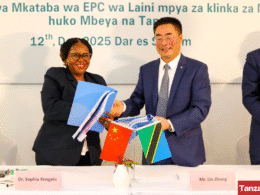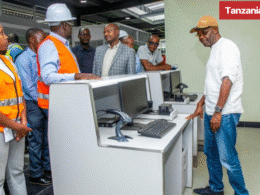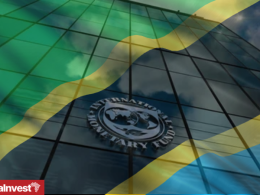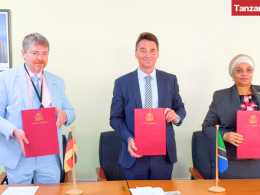The Government of Tanzania and the French Development Agency (AFD) signed on 20th June 2022 a financing agreement for a EUR 75M concessional loan to improve water supply and sanitation services for the residents of Shinyanga Municipality in northern Tanzania.
The financing’s ultimate goal is to improve the inhabitants’ living conditions, the environment, as well as the city’s economic development through the extension and renovation of drinking water and sanitation services.
In Shinyanga there is no sewerage system as most sanitation facilities are on-site systems such as pits and latrines, and the town has only recently been equipped with a small-scale fecal sludge treatment facility that is supposed to cover the whole municipality and its town centers.
This limited sanitation capacity carries a high risk for water-borne diseases in the municipality, with impacts the dwellers’ health and livelihood.
Besides, only 61% of the population has access to improved drinking water. The highest prevalence of diseases has been correlated with using shallow wells as a source of water and purchasing water from local vendors.
In particular, the project aims to :
- Give continuous and sustainable access to quality water to 95% of the population by 2025. The program will reduce water losses by 10%, through rehabilitation of the existing Ningw’a Dam and its water treatment plant, the construction of a new water reservoir of 2,500m³, and expansion and rehabilitation of 278km of existing and new transmission and distribution Water networks (88% expansion of new water networks and 12% reinforcement of the existing network). Besides the program aims at rehabilitating the existing 100km of transmission and distribution water networks, the electromechanical equipment, and the implementation of the Supervisory Control and Data Acquisition (SCADA).In addition, 50 water kiosks will be implemented to give access to the lowest-income households.
- Give access to sanitation services to at least 45% of the population by 2025. The program comprises a set up of 4 fecal sludge treatment facilities in Shinyanga town and town centers, the construction of about 30 toilets in schools, and 5 in dispensaries/hospitals and other identified public places.
- Provide technical assistance for the project’s implementation and capacity building of the Shinyanga Urban Water and Sanitation Authority (SHUWASA) who will implement the program. The Authority will benefit from technical assistance in managing investment projects, but also in becoming more effective in its fight against water losses. Besides, the program will ensure improvement of the management of the on-site sanitation via the capacity building of SHUWASA, a sanitation marketing strategy, and the improvement of the local institutional framework, sanitation campaigns and awareness creation.
Upon completion of this project, it is expected that approximately 200,000 people would benefit from the investment in water supply, 100,000 people from the investment in sanitation, and 50,000 people from awareness campaigns on hygiene.
AFD in Tanzania
AFD has been present in Tanzania since 2008. It intervenes thanks to loans to the State and the private sector to promote sustainable growth and reduction of poverty.
The water and sanitation sector has historically been one of AFD’s primary sectors of intervention in Tanzania with EUR 332 financings to this sector over the last 10 years.
AFD is working hand-in-hand with the Government of Tanzania to support the achievement of its objectives on Water and Sanitation through 3rd phase of the new Water Sector Development Program (WSDP 2006-2025).











